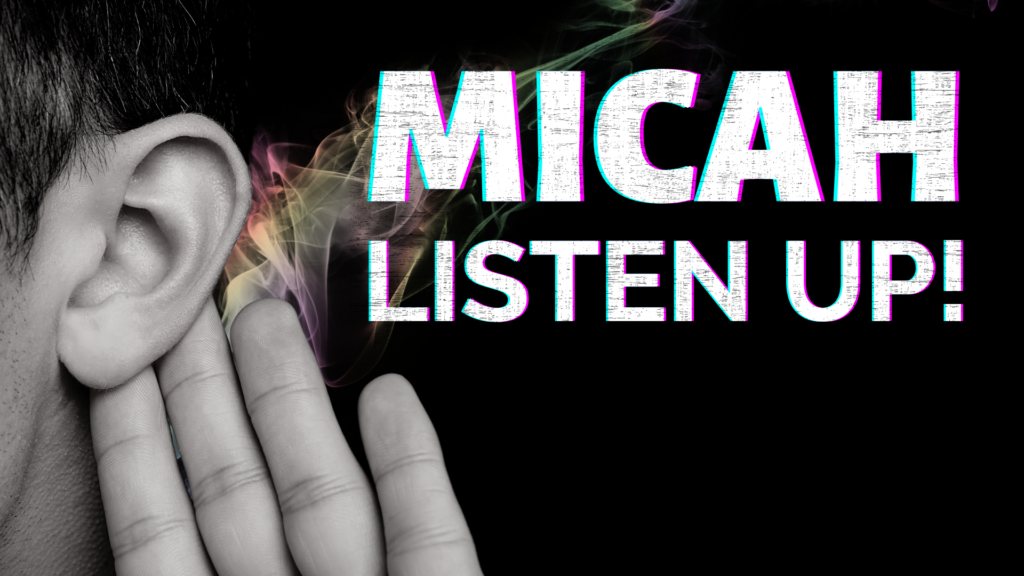I’ve spent my life as a small-town preacher. For the majority of that time, I have been caring for people from my hometown, many of whom I have known my whole life. Some preachers get to move to a new location where they’re not known and reinvent themselves, making up for the defects from their previous ministries. Others end up in big cities where they can move among the population in relative obscurity. Not me. I’m “Shorty’s boy,” “Brad’s little brother,” and “Another one of those Hammond kids.” I can’t fool my people about who I am, but neither can they fool me.
Meet Micah of Moresheth
I’ve dreamed of preaching a sermon series from Isaiah for several years, but I’ve never seemed to be able to make it work. Isaiah is a lot to bite off. I’ve read commentaries, taken classes, read how other preachers approached Isaiah and came away all the more certain that I can’t preach this book!
And then, one day, I stumbled across Micah of Moresheth. Micah, a contemporary of Isaiah, preached at the same time with a similar message. The difference, though, Micah was in the small town of Moresheth, about twenty miles outside of Jerusalem. It was a farming community, really just a fork in the road on the way to your real destination. Yet Micah remained there and remained faithful to his calling.
What if Micah, in his seven chapters, had more to say to the people in my small town than Isaiah with his sixty-six chapters?

Micah: Listen Up!
While your Bible has seven chapters in Micah, the internal structure of the book is divided into three messages or “oracles.” The divisions are found through Micah’s use of the word “Hear,” or, as I have phrased it, “Listen up!” You find these divisions in Micah 1:2, Micah 3:1, and Micah 6:1.
While my library has an abundance of commentaries on Isaiah, I was lacking research material for Micah. I found a few recommendations through some online searches and a friendly neighborhood Old Testament scholar.
The Books of Joel, Obadiah, Jonah, and Micah (The New International Commentary on the Old Testament) by Leslie C. Allen. This was my more scholarly commentary. An excellent overview with good word study material.
The NIV Application Commentary: Minor Prophets. This series has quickly become my “go to” for preaching commentaries. I love the structure.
The Expositor’s Bible Commentary: Hosea, Amos, Micah. My longtime “go to” for preaching. I love this series. I’ve bought it in three separate formats, and they’d love for me to buy it again! Not gonna happen!
Micah for You: Acting Justly, loving Mercy, by Stephen Um. Short and devotional. I had high hopes for this one, but it let me down. Don’t waste your time.
The One That Got Away
A Commentary on Micah, by Bruce K. Waltke. I couldn’t bring myself to buy a 500-page commentary on a seven-chapter minor prophet! However, this is the one everyone else referenced. If you’re doing a serious study of Micah, you’ll want to check this one out!
Articles of Note
I dug through a few articles from others who had preached through Micah for some ideas and encouragement. I was able to glean a few ideas from these.
Preaching Pointers from Micah, by David Norman. “Micah is not merely a book of judgment. It is a book of hope and restoration.”
3 Reasons You Should Preach Through Micah, by Mark Livingston. “Justice is a huge issue for Micah. He denounces those who oppress the poor (2:1-3), abuse their positions (3:1-3), and rib the needy (6:9-11). Women and children are cherished, and the exploitation of the innocent is denounced (1:8-9).”
Jesus is Coming—So What? by Chase Campbell. A sermon over Micah 4.
Assembling the Series: Micah: Listen Up!
Rather than do a verse-by-verse exposition of Micah, I chose to hit a few key passages and themes. The first thing I needed to do was build a connection, not just with Micah, but with his small town of Moresheth. The small-town folks who listen to me preach needed to know God not only heard them but spoke to people like them.
Micah: Listen Up
My opening overview sermon. I used this one to introduce both Micah’s character and message, as well as his hometown. I did my best to help them see connections to our small-town experiences and our need to obey God’s call in a world that doesn’t always listen to God’s word.
God Calls Us to Lament; Micah 1:1-9
There was no way I could preach Micah and get around the topic of “lament.” The problem is that in our world, we want messages that pump us up and make us feel good! I needed to show them that healing begins when our hearts break with God’s heart.
The Shepherd, the Breaker, and The King; Micah 2:12-13
Micah 2:12-13 contains three images of God. While two of these are familiar to us (shepherd and king), Micah uses them in ways and in a social context that is foreign to us. For simplicity’s sake, I chose to preach this as a three-point sermon.
Fun Fact: Chat GPT wrote my explanation of what a breaker/breacher is for me!
He Shall Be Their Peace; Micah 5:1-5
One of the challenges here was writing a sermon over a Christmas text without writing a Christmas sermon. Of course, the holiday had to be addressed, but it was not the focus.
This sermon was written, in part, as a requirement for a class I was taking. It was written following the model of Paul Scott Wilson in his book The Four Pages of the Sermon.
Do Justice, Love Kindness, Walk Humbly; Micah 6:8
My sermon over what many consider to be Micah’s key verse, if not a key verse for the entire Bible. The easy option would have been a simple three-point sermon, but I opted to do this one in moves to encourage thought and conversation.
Who Is Like God? Micah 7:18-20
The final verses of Micah, but not my final sermon. I had a lot of fun with this one and enjoyed illustrating it. The response was better than I could have hoped for.
Adequate Faithfulness; Micah 3:12; Jeremiah 26
While researching this sermon series, Dr. Mark Mangano from Lincoln Christian University insisted that I take the series to Jeremiah 26 to show that “the preaching of small-town Micah would save the life of big-city Jeremiah.” I was able to make this final sermon intensely personal for our congregation and have them looking both backward and forward.
This sermon did a wonderful job of putting a cap on the whole series. I told several friends, “If I die and this is the last sermon I ever preach, I’ll be satisfied.”
And One More for Good Measure
Under The Fig Tree; Micah 4:1-5
I preached this sermon on Memorial Day in 2022 after discovering that this passage from Micah was much beloved by George Washington and several other of our founding fathers. Our church has strong tendencies toward patriotism, and I felt this passage would bring some much-needed perspective for them.
Micah in Your Moresheth
This sermon series was definitely new material for my audience as well as for me. We handled it well together, though. I had to lay a lot of ground work, going back and reviewing Old Testament history with them, as well as returning again and again to that key passage of Micah 6:8. I believe it was important for my audience to hear a voice from a small town like theirs and know that God doesn’t just speak to the big city churches!
You don’t have to be a small-town preacher to appreciate Micah. As witnessed by Jeremiah 100 years later and George Washington sitting under his own vine at Mount Vernon, the message of Micah is timeless and always needed. As long as there is injustice, unkindness, and arrogance we will need those who remind us to do justice, love kindness, and walk humbly with our God.
